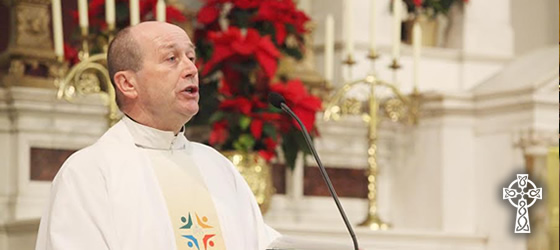Mass of Peace 2015
Homily notes of Mgr Eoin Thynne for the New Year’s Day Mass 2015

Mgr Eoin Thynne delivers the New Year’s Day of Prayer for Peace homily 2015*
I wonder how many people here this morning think that the future will be better than the past, and all problems can be solved if we put our minds to it. I wonder how many people not here, those on the streets, in hostels or suffering an addiction think the same way. Let us begin the New Year with optimism and confidence; equipped for action, dressed for battle, filled with hope and realism, not fear or cynicism.
Each year we become more and more aware how much our world cries out for peace and justice. The poor and the oppressed cannot understand or cannot accept a situation where the great nations of the world oppose and condemn them as they do all in their power to defend their basic rights and human dignity.
In humility and simplicity, Pope Francis calls us “to be protectors of each other, of the natural world, of the poor and vulnerable.” No matter what part of the world we come from, we are all basically the same. We all seek happiness and try to avoid suffering. We have the same human needs and concerns. All of us want freedom and the right to determine our own destiny as individuals. That is human nature. The great changes taking place in the world are a clear indication of this.
Our concerns this morning as we begin the New Year should extend to all members of the human family and, indeed, to all who suffer. Suffering is caused by ignorance. People inflict pain on others in the selfish pursuit of their own happiness or satisfaction.
Yet true happiness comes from a sense of peace and contentment, which in turn must be achieved through the cultivation of altruism, of love and compassion, and the elimination of ignorance, selfishness, and greed.
The people of Israel, who suffered persecuted and oppression, expected to be delivered, and pinned all their hopes on Jesus. But they failed to see the evidence of God in front of them. It was the shepherds, the lowliest of all who recognised him; ‘it was exactly as they had been told’.
Unfortunately, there are too many who do not recognise the presence of God in our world. Others are not open to the Spirit of his Son in their hearts.
The problems we face today, violent conflicts, destruction of nature, poverty, hunger and slavery, are human created problems which can be resolved through human effort, understanding and developing a sense of brotherhood and sisterhood. We need to cultivate a universal responsibility for one another and develop a generous heart even for those we consider our enemies. But we will achieve nothing if we are no more than mobile war zones, carrying an arsenal of hate and spite, and taking up battle stations for revenge every day. He who is not at peace with God cannot be at peace with himself and will never be at peace with his neighbour. If I am not at peace with my God then I am nothing but an instrument of confusion, adding my own anxieties to a war weary world.
So how can we make a difference in bringing peace to this world that we love and cherish so much?
The force of power never wins against the power of love. At this time of unrest and turmoil in our world, the greatest force to be reckoned with lies within our hearts — a force of love and tolerance for all. We can resolve the greatest of our differences if we dare to have a constructive conversation with our enemy.
War always inflicts pain and sorrow on everyone. Of the one hundred and thirty four wars raging in our world today, one of the greatest is the war of oppression. Imagine being forced to work without pay, unable to walk away, subject to constant threats and violence. This is the daily reality for millions in modern slavery. Modern slavery takes many forms, and is known by many names.
History tells us that slavery was abolished in the eighteen hundreds, but today, slaves are trapped in fishing fleets and sweatshops, mines and brothels, and in the fields and plantations of countries across the world. It can be called human trafficking, forced labour, or it can refer to the slavery-like practices that include debt bondage, forced or servile marriage, and the sale or exploitation of children.
No matter what it is called, victims of modern slavery have their freedom denied, and are used, abused, controlled, and exploited by another person for commercial or personal gain.
While it is illegal in all countries, the facts show modern slavery exists in every society and across a wide range of industries, imprisoning thirty six million people. There is a responsibility on all of us to bring an end to this war.
Ending slavery not only extinguishes an injustice but sets people free and enables them to contribute to their community thus creating prosperity.
In his letter to the Galatians, St. Paul tells us: “You are no longer a slave but a child, and if a child then an heir, through God.” There is a beautiful progression here. First we are set free from slavery, the slavery of sin. Then we are declared children and adopted into God’s family; and as children we are made heirs. Heirs inherit something and Paul makes it clear what we inherit is God Himself. For some this might seem like a small inheritance, yet for those who believe in Christ and who really love God, to be an heir of God is the richest inheritance of all.
There are too many children in our world who are lost to slavery. Human trafficking rips apart the lives of the innocent and the helpless. Children who should embrace life with a heart full of sweet dreams for the future are left, in the end, destroyed and discarded. To destroy another person’s life is a misuse of God’s gift.
Trafficking in human beings is one of the greatest scandals and tragedies of our age. It is intolerable that millions of fellow humans should be violated in this way, subjected to inhuman exploitation and deprived of their dignity and rights. In the words of Pope Francis: “Human trafficking is an open wound on the body of contemporary society. It is a crime against humanity.”
This outrage should concern each one of us, because what affects one part of humanity affects us all. Virtually every part of this world is touched in some way by the cruelty and violence associated with this criminal activity.
To celebrate World Day of Peace and remain insensitive to the trafficking of humans is to betray the very meaning of what peace is about. Loving our neighbour places responsibilities upon all of us. We have a responsibility to speak out even when it might be easier to remain silent. We have a responsibility to point to injustice and to challenge, even when it is the unpopular thing to do.
It shouldn’t come as a surprise to anyone that the Church has been speaking out and highlighting injustices. The Council for Justice and Peace constantly speaks out and challenges us. Its message is one of hope inspired by the life of Jesus Christ. The social teaching of the church places particular emphasis on the dignity of the human person because we are formed in the image and likeness of God.
The Church is not part of the ‘something must be done’ brigade; but is very much part of the ‘we will do something’ brigade. How obvious this is when both the Church and the Government here in the Archdiocese responded to the crisis of homelessness in the city. I echo the words of Archbishop Martin in acknowledging the debt of gratitude to the Lord Mayor and his staff and the many organisations for all they have achieved in a short time.
We need to keep responding to the challenge God has set before us. We need the imagination to see where we can do more, to fight the good fight. We need to be rooted in the vision God has set out for us; a vision of welfare and justice. It is the common good and justice that transforms our communities and will transform our city.
As we begin this New Year let us get out of the trenches and face the future with hope and optimism. If we remain anonymous Christians, hoping for peace and an end to slavery in the same was as we hope for a good summer, then nothing will change and war and violence and suffering will continue to exist in our world.
May we follow the example of the shepherds who came and worshipped, recognised Jesus for who He was and returned rejoicing.
Filled with the joy of the new born Saviour, filled with the spirit of peace and goodwill, there is no need for any of us to look as though we have just come from a funeral. Today is a new beginning. Let us make a fresh start. Collectively and individually we carry the good news that Isaiah prophesied and Jesus proclaimed. Armed for battle, faithful in prayer, reconciled by Christ, despite our failings the future is one of joy and hope.
There is every possible reason to be optimistic about the year ahead. Optimism does not come from us, but because to us and to all people God has sent the Spirit of his Son into our hearts, crying, ‘“Abba! Father!” So you are no longer a slave but a child, and if a child then also an heir, through God.’
May the glory of God fill our lives as we advance, and together, may we succeed in building a better world through human understanding and love, and reduce the pain and suffering of all people.
* photo courtesy of Mr John McElroy
